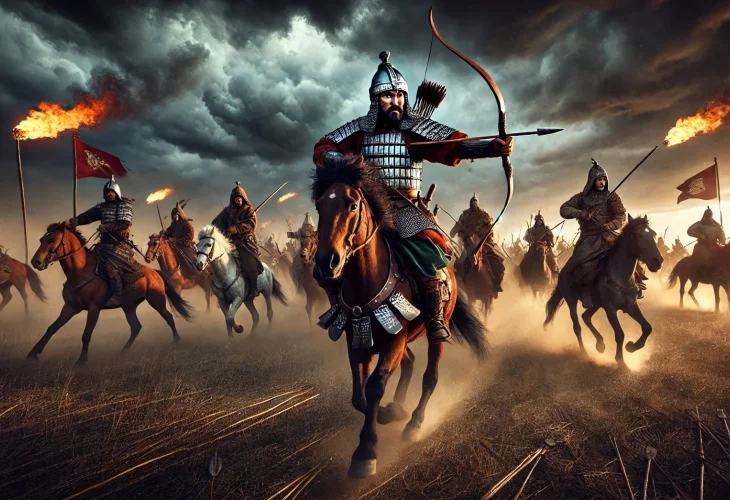Surviving the Mongol Conquests: How the Jews Endured History's Fiercest Empire
When faced with Mongol invasions, resistance often meant annihilation. Yet, amid the Mongols' fierce conquests, Jewish communities found ways to endure.

In the 13th century CE, about seven hundred years ago, the world was shaken by an unprecedented event. A previously unknown leader from an obscure people created an empire within a few years that conquered most of the world. It surpassed the empire of Alexander the Great and the Roman Empire in size. In fact, it was the largest empire in history over contiguous land. (The British Empire held overseas territories, which made it larger, but not over contiguous land.)
Yet, as quickly as this empire rose, it faded away, leaving behind almost nothing but unimaginable destruction and ruin. Their first defeat occurred in the Land of Israel, in 1260, at the Battle of Ain Jalut. They lost to the Mamluks and soon after collapsed within themselves.
Between Russia and China stretch endless, arid, yellow steppes. High, pointed mountain ranges cross them. For thousands of years, groups of slant-eyed nomads wandered these steppes, in constant rivalry. All this changed when a child named Temujin was born to the Borjigin tribe. He was energetic, determined, brave, and ruthless. As a small child, he killed his brother, was captured by a rival tribe, escaped, and organized tribal wars, always finding himself on the winning side. The final battle, known as the "Battle of the Thirteen Wings," against the Jamuka tribe, was short and brutal. The rivals were defeated, and all Mongolian nomads united under the rule of Genghis, now known as "Genghis Khan" (Khan – ruler).
Genghis Khan turned all Mongols into soldiers, fierce warriors, and natural hunters. Mongol divisions stormed across the East, conquering city after city. The rule was: any city showing any form of resistance would see all its inhabitants slaughtered, from youth to the elderly, infants and women. The Mongols' cruelty became legendary. It was simply not worth resisting them, besides the fact that Genghis Khan was a military genius. He introduced the use of densely packed shields that successfully deflected arrows, instead of heavy metal shields. Each warrior in his army had five horses, as there was no shortage of wild horse herds in Mongolia. He conquered China, Persia, the Arab lands, and parts of Europe, and within a few years, he controlled the entire inhabited world.
Genghis Khan died before complete control was achieved in all conquered territories, and he appointed his successor, Hulagu Khan, as king of the empire under him. He continued the Mongolian method. In 1268, he turned to the city of Baghdad, which resisted. He destroyed all its inhabitants: eight hundred thousand people were slaughtered that day.
However, Hulagu himself was not wholly comfortable with his actions. Raised in a superficial pagan culture, he recognized that the religions based on the Torah of Moses were far superior to paganism. Yet, he could not reconcile with Islam in any form, as his main enemies were Muslims, who were just as cruel as the pagans. But from Jews and Christians, he learned that the Torah opposes such cruelty, and he listened to their words. And not only him: many of his soldiers would listen to Christian emissaries, as well as to Jewish sages. A 14th-century German writer reports that as the Mongols reached Europe, they would gather to listen to Jewish and Christian religious leaders.
Hulagu's ministers debated among themselves how to treat the Jews, and a wise Jew close to him convinced him not to treat Jews cruelly. The Mongols invented the concept of a "medical corps," and alongside every military unit, there was a medical team of doctors and medics, many of whom were Jewish. A high-ranking Mongolian named "Kuli" fell seriously ill, and the Jewish doctors saved his life. This gave them an opportunity to explain the principles of Judaism, which influenced the Mongols to some extent.
As a result, they spared Jews in many instances where massacres occurred. During the Baghdad massacre mentioned above, the Mongols secretly extracted the entire Jewish community of Baghdad, saving them from the grim fate of the rest of the city's inhabitants. Previously, the Mongols had massacred Aleppo in Syria for five days, but they declared six buildings as sanctuaries where no blood would be shed. One of them was the Jewish synagogue, sheltering thousands of Jews.
Jews saw these events as signs of the coming of the Messiah: the world was in turmoil, pagans fought each other, and Jews were spared. Rabbi Shlomo DaPiera of Girona, a disciple of Ramban, wrote a poem on the subject, saying, among other things: "How Babylon, Aleppo, and Damascus were captured and cities were desolate – and I see wandering salvation as a miracle and my future shines like the sun – and my sanctuary, the temple, will be built and established, from the house to the rows." Perhaps Jews thought that the Mongols would destroy Muslim rule in the land and allow them to build the Temple. But upon reaching the Land of Israel, the Mongols began to fall.
Hulagu, who was a mass murderer responsible for the destruction of hundreds of cities, perhaps reconsidered after the Mongols' defeat at Ain Jalut. He left the Mongolian people and became a Buddhist monk. However, the destruction and ruin sown by his people in the world took hundreds of years to repair. Historian Eliyahu Ashtor writes: "All the crusades are nothing compared to them... almost everywhere the Mongol foot trod, unmatched devastation unfolded. Lands whose fertile settlement had never before been absent became jackal haunts, and many cities became endless ruins."

